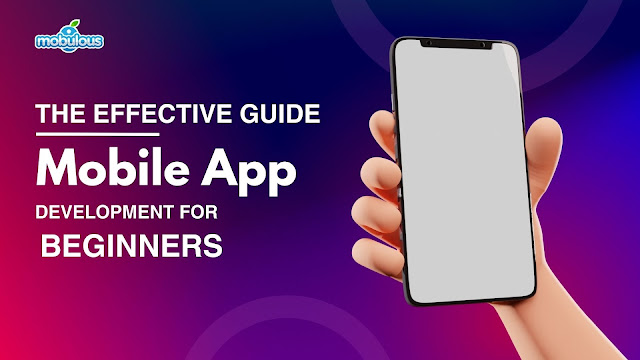Welcome to the ultimate guide for mobile app development! If you're a beginner with dreams of creating the next big app, this comprehensive guide will walk you through the essential steps, tools, and tips to get started. From understanding the basics to deploying your app, we’ve got you covered.
Why Mobile App Development?
Mobile app development is one of the most dynamic and
exciting fields today. With millions of apps available across platforms like
iOS and Android, and billions of users worldwide, the opportunities are
immense. Whether you want to solve a problem, create a game, or start a
business, mobile apps can be a powerful medium.
Getting Started: The Basics
Understand the Market
Before diving into development, it's crucial to understand
the market. Research current trends, popular apps, and user needs. Identify
your target audience and the problem your app will solve.
Choose the Right Platform
Decide whether you want to develop for iOS, Android, or
both. iOS apps are developed using Swift or Objective-C, while Android apps use
Java or Kotlin. Cross-platform development tools like Flutter and React Native
allow you to create apps for both platforms simultaneously.
Learn the Fundamentals
Familiarize yourself with the basics of programming and
mobile development. Key concepts include:
- Programming
Languages: Start with languages like Swift (iOS) or Java/Kotlin
(Android).
- Development
Tools: Learn to use Xcode for iOS and Android Studio for Android.
- User
Interface (UI) Design: Understand the principles of designing
user-friendly interfaces.
Tools and Technologies
Development Environments
- Xcode:
The official IDE for iOS development. It includes tools for designing,
coding, testing, and debugging.
- Android
Studio: The official IDE for Android development, offering a robust
set of features to develop, test, and debug Android apps.
Cross-Platform Development
- Flutter:
A UI toolkit from Google for building natively compiled applications for
mobile, web, and desktop from a single codebase.
- React Native: A popular framework maintained by Facebook that allows
developers to use React along with native platform capabilities.
Design Tools
- Sketch:
A vector graphics editor used for UI/UX design.
- Figma:
A web-based UI design tool that supports real-time collaboration.
- Adobe
XD: A vector-based tool for designing and prototyping user
experiences.
The Development Process
1. Planning
Start with a clear plan. Define the app's purpose, features,
and user journey. Create wireframes and mockups to visualize the app.
2. Design
Design the app's user interface (UI) and user experience
(UX). Focus on creating an intuitive, attractive, and user-friendly interface.
Ensure your design adheres to platform-specific guidelines (iOS Human Interface
Guidelines and Android Material Design).
3. Development
Begin coding your app. Break down the project into
manageable tasks and milestones. Follow best practices for coding, such as
keeping your code clean, modular, and well-documented.
4. Testing
Test your app thoroughly to ensure it works as intended. Use
both manual testing and automated testing tools. Test on real devices and
simulators/emulators to catch platform-specific issues.
5. Deployment
Once your app is tested and ready, it's time to deploy. For
iOS apps, submit to the App Store via App Store Connect. For Android apps,
publish to Google Play using the Google Play Console. Follow the guidelines and
requirements of each platform to ensure a smooth approval process.
Tips for Success
- Start
Small: Begin with a simple project to learn the ropes before tackling
more complex apps.
- Stay
Updated: Mobile development is a rapidly evolving field. Stay
up-to-date with the latest trends, tools, and best practices.
- Join
Communities: Engage with online communities like Stack Overflow,
GitHub, and developer forums. Networking with other developers can provide
valuable insights and support.
- Keep
Learning: Invest time in continuous learning. Take online courses,
attend workshops, and read blogs and books on mobile development.
Conclusion
Embarking on your mobile app development journey can be both
challenging and rewarding. By following this guide, you'll gain a solid
foundation to build and launch your first app. Remember, persistence and
continuous learning are key to becoming a successful mobile app developer.
Our Google Links:
- https://toolbarqueries.google.com.mx/url?q=https%3A%2F%2Fwww.mobulous.com%2F
- https://toolbarqueries.google.com.my/url?q=https%3A%2F%2Fwww.mobulous.com%2F
- https://toolbarqueries.google.co.mz/url?q=https%3A%2F%2Fwww.mobulous.com%2F
- https://toolbarqueries.google.com.na/url?q=https%3A%2F%2Fwww.mobulous.com%2F
- https://toolbarqueries.google.ne/url?q=https%3A%2F%2Fwww.mobulous.com%2F
- https://toolbarqueries.google.com.nf/url?q=https%3A%2F%2Fwww.mobulous.com%2F
- https://toolbarqueries.google.com.ng/url?q=https%3A%2F%2Fwww.mobulous.com%2F
- https://toolbarqueries.google.com.ni/url?q=https%3A%2F%2Fwww.mobulous.com%2F
- https://toolbarqueries.google.nl/url?q=https%3A%2F%2Fwww.mobulous.com%2F
- https://toolbarqueries.google.no/url?q=https%3A%2F%2Fwww.mobulous.com%2F
- https://toolbarqueries.google.com.np/url?q=https%3A%2F%2Fwww.mobulous.com%2F
- https://toolbarqueries.google.nr/url?q=https%3A%2F%2Fwww.mobulous.com%2F
- https://toolbarqueries.google.nu/url?q=https%3A%2F%2Fwww.mobulous.com%2F
- https://toolbarqueries.google.co.nz/url?q=https%3A%2F%2Fwww.mobulous.com%2F
- https://toolbarqueries.google.com.om/url?q=https%3A%2F%2Fwww.mobulous.com%2F

Post a Comment